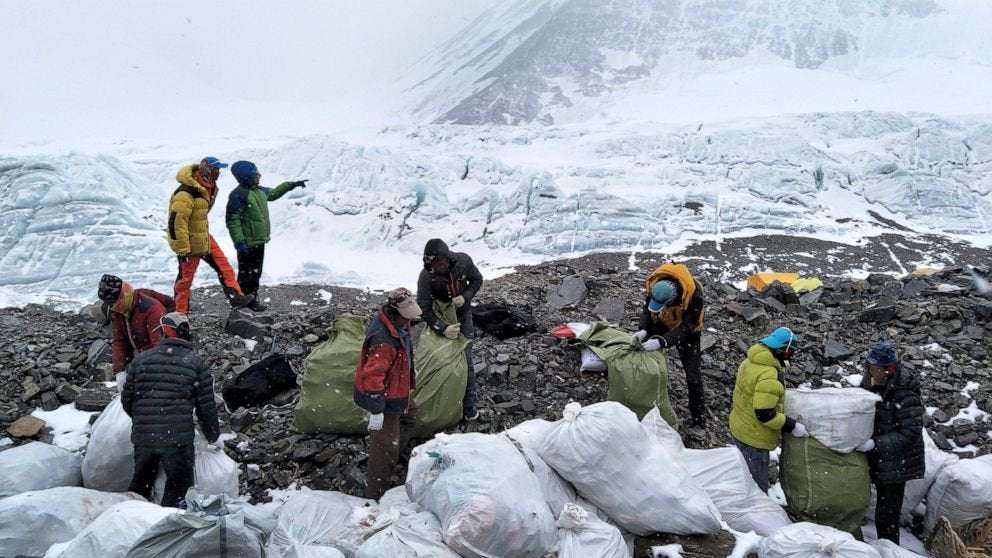Mount Everest tackles 60,000-pound trash problem with campaign to clean up waste Thousands of pounds of trash is strewn across the world's highest peak.
You don’t need a map to get to the Everest base camp, just follow the trash, says climber Dragana Rajblovic.
Rajblovic knows what she's talking about: She's the only Balkan woman to have conquered Mount Everest.
To date, 5,200 men and women have climbed to the peak of the world's highest mountain, according to Ang Tshering Sherpa, former president of the Nepal Mountaineering Association. Another 775 are planning to test themselves against the 29,029-foot mountain this year.
And all of them have brought -- or will bring -- many pounds of gear with them to enable their weeks-long ascent to Everest's summit. But what goes up, does not necessarily come down. Much of it gets left behind.
According to the Everest Summiteers Association, which has, in recent years, taken tons of debris off the mountain, there are still about 30 tons of trash left on the mountain.
In this Monday, Feb. 22, 2016 file photo, trekkers pass through a glacier at the Mount Everest base camp, Nepal. AP Photo/Tashi Sherpa
Since April 14, New Year's Day on the Nepalese calendar, teams of volunteers have picked up an estimated 6,600 pounds, most of it simple trash or human waste. But more than a ton of non-biodegradable waste -- oxygen canisters, torn-up tents, plastics and left-over mountaineering gear -- has been flown to the capital of Kathmandu by Nepali Army helicopters for disposal.
Their goal is to pick up 22,000 pounds of trash by the end of their 45-day campaign on May 29, the 66th anniversary of the first successful summit of Everest by Sir Edmund Hillary and Tenzing Norgay. The campaign is estimated to cost 23 million Nepalese rupees, about $206,540, according to Nepal's Department of Tourism.
This is the first time that all stakeholders have come together to clean up the world’s highest peak, Dandu Raj Ghimire, director general of the tourism department, told ABC News.
''I don't even know who they are, there are so many groups doing the cleaning-up campaign,'' said Ang Tshering. ''I have been amazed at coming across so many ordinary people, NGOs and military picking up garbage."
In this May 8, 2017, file photo released by Xinhua News Agency, people collect garbage at the north slope of the Mount Everest in southwest China's Tibet Autonomous Region. Awang Zhaxi/Xinhua via AP
Their job has, unfortunately, been made easier by global warming. The melting snow and ice are exposing dead bodies as well as all that debris.
"Snow and glaciers are fast-melting," Ang Tshering told ABC News.
"In 2017, seven bodies were found by climbers who were trying to clean up Everest, as well as 15 tons of human waste and many more tons of trash,” he said.
At least 303 people have died attempting to climb the mountain, according to Ang Tshering, who is a fourth-generation sherpa, or guide.
The cleanup may only be a temporary solution to the garbage problem. With 775 fresh climbers this season, and thousands more in the years to come, the abandoned waste piles will only grow. The Government of Nepal now demands that each climber deposit $4,000, which is refundable only if the climber brings down at least 17.6 pounds of trash on his or her way off the mountain.
In this April 4, 2019 photo, record holding Sherpa guide Kami Rita checks oxygen cylinders and other supplies needed for climbing Mount Everest, in Kathmandu, Nepal. AP Photo/Niranjan Shrestha
But even that may not stem the garbage tide, given that a “guided climb” up and down Everest can cost as much as $100,000. A $4,000 garbage tax may feel like "tip money."
Still, Ghimire said failure is not an option for a mission "to restore glory to the mountain."
"Everest," he said, "is not just the crown of the world, but our pride."

RoseyOneOne on January 19th, 2020 at 01:25 UTC »
Everest is a pay your way up for a lot of the people that go. Some guides probably bring extra trash down but the clients are going to be too gripped to do that. They’ll just pay the $4k.
Edit: just adding this bit. I’ve climbed a lot. I also worked for the president of the Alpine Club of Canada 20 years ago and—even back then—he said climbing Everest is a “triumph not of climbing but in fundraising.”
There isn’t much real climbing on Everest, it’s still an epic thing, I guess, but in climbing circles it’s far more legit, and impressive, to guide yourself up a different 8000m peak and do it with minimal trace of you ever having been there.
It’s almost a conveyer belt of dentists and accountants following fixed lines to the top. Not my thing.
https://images.dailyhive.com/20190605122935/60998393_2155658071155528_7048657578938597376_n.jpg
DeanMatty on January 19th, 2020 at 01:09 UTC »
Seemed like an odd mass of trash. But 17.6/2.2= 8. So it's 8 kg. A nice round number. Makes more sense.
DennisNedrey on January 19th, 2020 at 01:02 UTC »
If I bring back 35.2 pounds of trash do I get an extra $4000?